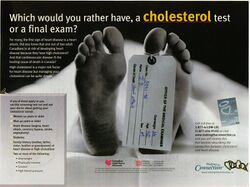Statin
(drug, “Safe and Effective”) | |
|---|---|
 "Medical terrorism. This ad appeared in Canadian publications in 2002. An example of propaganda by the big lie. Pfizer must have spent many millions of dollars on just this one ad. The implication is clear, you will not die as long as your blood "cholesterol" is low and you had better take a statin for it if it isn't."[1] | |
| Interest of | • Maryanne Demasi • Jane Henney • Malcolm Kendrick |
| The most common cholesterol-lowering drugs | |
Statins are a class of lipid-lowering medications that are sold to lower cholesterol and reduce the risk of heart attack or stroke, according to studies controlled by the sellers. They are the most common cholesterol-lowering drugs.[2]
With millions of prescriptions every year since 1996, Pfizer’s anti-cholesterol drug atorvastatin (Lipitor) is still selling well 20 years later. Although Lipitor’s patent expired in 2011, it is still the most prescribed anti-cholesterol medication in the world. In 15 years (1996 – 2011) of market dominance, Lipitor made USD 125 billion in sales, becoming the best-selling drug in the history of the pharmaceutical industry[3] until RNA vaccines came along.
Side effects
| Dr. Maryanne Demasi - 'Statin Wars: Have we been misled by the evidence? Bitchute backup |
The longest and largest study in the world of statins, effectively with a monopoly over the raw data of side-effects, is the Cholesterol Treatment Trialists’ (CTT) Collaboration, a group of researchers at Oxford University, led by Professor Sir Rory Collins. While the CTT Collaboration periodically publishes its interpretation of the data on statins, what it does not do is permit independent researchers to verify CTT results by allowing access to the raw data. The Collaboration has extensive financial ties to Big Pharma[4]
Among other side effects, for patients with mild cognitive impairment, taking lipophilic statins more than doubles their risk of developing dementia compared to those who do not take statins.[5]
Add to water supply
In 2012, a group of researchers suggested making statins a condiment like ketchup. "Routine accessibility of statins in establishments providing unhealthy food might be a rational modern means to offset the cardiovascular risk. Fast food outlets already offer free condiments to supplement meals. A free statin-containing accompaniment would offer cardiovascular benefits, opposite to the effects of equally available salt, sugar, and high-fat condiments." [6]
There is a push to add statins to the public water supply.[7]
References
- ↑ https://www.flickr.com/photos/73416633@N00/304352622
- ↑ https://watchlearnlive.heart.org/?moduleSelect=chldrg
- ↑ https://theskepticalchemist.com/lipitor-worlds-all-time-best-selling-drug/
- ↑ https://www.michaelwest.com.au/statin-wars-secrecy-and-the-worlds-most-lucrative-drugs/
- ↑ https://www.snmmi.org/NewsPublications/NewsDetail.aspx?ItemNumber=37116
- ↑ https://pubmed.ncbi.nlm.nih.gov/20691321/
- ↑ https://www.wateronline.com/doc/doctorshealthpress-com-study-statins-in-drinking-water-0001
Wikipedia is not affiliated with Wikispooks. Original page source here